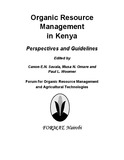| dc.description.abstract | The Forum for Organic Resource Manage
ment and Agricultural Technologies
serves as a platform for promoting innovation among those seeking to make better
use of what is too often overlooked.
These under-utilized organic resources
include crop residues, agro-industrial
by-products, domestic wastes and native
plants with poorly understood properties.
Perspectives on the value of organic
resources differ greatly. For example, on large farms, crop residues are considered
a disposal problem while the poorest of smallhold farmers must scavenge for crop
roots as a source of cooking fuel.
The rush towards moderni
zed agriculture has bypasse
d better use of what was
already available in rural areas, and the
traditional knowledge to realize this lost
advantage is held by fewer members of the rural community as time passes.
Meanwhile in urban areas, accumulating garbage subjects residents to offensive
sights and odours as well as unnecessary health risks. Waste recycling is too often
viewed by planners and much of the pu
blic as a large-scale industrial process, not
as an opportunity for cottage industry or more efficiently operated households.
But we humans are very adept at r
esponding to changing circumstances,
usually because we are responsible in one
way or another for the changes in the
first place. If necessity is the mother
of invention, then under-utilized organic
materials must be the father because w
ithout curious minds and busy hands it is
unlikely that we will improve our wellb
eing and surroundings. Ambitious humans
do not allow useful materials to be wasted and through a process of trial and error,
we will develop means to turn adversity
into advantage, and as we develop
experience and skills, we discover the solu
tions that hopefully will not lead to
greater, unforeseen problems in the future.
As Lamech Nyangena concluded in
his hand-drawn poster at the first
FORMAT event in September 2000, “
Surely nothing is useless!
” While some
sophisticates dismissed this proclamation
by a smallhold tea farmer from Kisii
district as simplistic, most in attendance
rallied to the call and, over the next two
annual FORMAT events, many things ha
d surely become valuable! Water
hyacinth was being processed into compost, animal feed and handicrafts. Pest
control products prepared from the ne
em tree were carefully documented and
attractively packaged, rather than rese
mbling “backroom concoctions”. Useful
oils, exudates and gums were being recove
red and marketed by entrepreneurs, and
their new products were provided free public
ity by national news organizations.
Seeds and products from under-recognized
traditional crops were displayed and
distributed. Research officers and farmers stood shoulder to shoulder examining
composts prepared from different materials
and stored in different ways. Cooking
briquettes, household items, even plastic fence posts fabricated from domestic
wastes were displayed and being market
ed by entrepreneurial self-help groups. | en |

